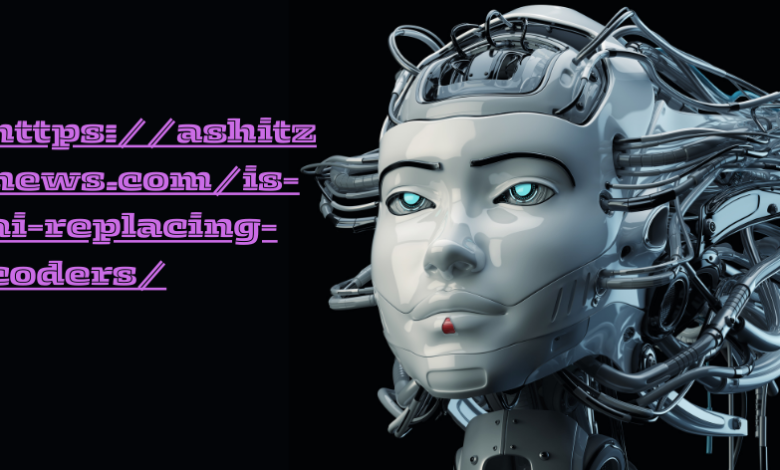Https://ashitznews.com/is-ai-replacing-coders/

With advancements in machine learning and natural language processing, AI has become increasingly proficient in assisting and even automating various aspects of https://ashitznews.com/is-ai-replacing-coders/ . From identifying patterns in data to generating code snippets, AI algorithms are revolutionizing how software is developed.
AI in Coding
Automation of Repetitive Tasks
One of the primary roles of AI in coding is automating repetitive tasks that consume significant time and resources for developers. For example, AI-powered tools can swiftly detect and fix syntax errors, freeing up developers to focus on more complex problem-solving tasks.
Code Generation and Optimization
Moreover, AI algorithms can generate code based on predefined parameters and requirements. This functionality is particularly beneficial in scenarios where developers need to produce large volumes of code quickly, such as in software prototyping or during the initial stages of development. Additionally, AI can optimize existing code by identifying inefficiencies and proposing enhancements, leading to more streamlined and performant applications.
Benefits of AI in Coding
Increased Productivity
By automating mundane tasks and streamlining the development process, AI significantly boosts productivity in coding. Developers can accomplish more in less time, leading to faster project delivery and improved time-to-market for software products.
Reduction of Human Error
Another notable advantage of AI in coding is its ability to minimize human error. Unlike humans, AI algorithms do not suffer from fatigue or distractions, resulting in more accurate and reliable code. This, in turn, reduces the likelihood of bugs and software defects, enhancing the overall quality of the codebase.
Accessibility to Coding for Non-Experts
AI-powered coding tools also lower the barrier of entry for individuals with limited coding experience or expertise. Through intuitive interfaces and automated suggestions, even non-experts can engage in coding activities, democratizing access to software development.
Challenges and Concerns
Despite the promising advancements, the integration of AI in coding poses several challenges and concerns that warrant careful consideration.
Job Displacement Fears
One of the most pressing concerns surrounding AI in coding is the potential displacement of human coders. As AI algorithms become more proficient in handling coding tasks, there is apprehension about the future job market for developers and the possibility of widespread unemployment.
Quality Assurance and Accountability
Another challenge is ensuring the quality and accountability of AI-generated code. While AI can produce code quickly, there is a risk of overlooking critical aspects such as security vulnerabilities or adherence to coding standards. Developers must implement robust testing and validation procedures to mitigate these risks.
Ethical Considerations
The ethical implications of AI in coding also cannot be ignored. From bias in algorithmic decision-making to the ethical use of AI-generated code, there are profound ethical considerations that require thoughtful deliberation and regulatory frameworks.
Future of Coding with AI
Collaboration Between Humans and AI
Despite the concerns, the future of coding lies in collaborative efforts between humans and AI. Rather than replacing human coders, AI is poised to augment their capabilities, enabling them to tackle more complex challenges and innovate more rapidly.
Skill Enhancement and Retraining
Furthermore, the integration of AI necessitates ongoing skill enhancement and retraining for developers. As AI assumes routine tasks, developers can focus on cultivating higher-order skills such as problem-solving, creativity, and domain expertise, ensuring continued relevance in the evolving technological landscape.
Conclusion
In conclusion, while AI is transforming the landscape of coding with its automation and optimization capabilities, it is unlikely to completely replace human coders. Instead, AI serves as a powerful ally, enhancing productivity, reducing errors, and democratizing access to coding. However, addressing challenges such as job displacement fears, quality assurance, and ethical considerations is crucial for realizing the full potential of AI in coding.
FAQs
- Is AI capable of writing entire software applications on its own?
- While AI algorithms can generate code snippets and assist in various aspects of development, writing entire software applications autonomously remains a challenge due to the complexity and context-specific nature of coding tasks.
- How can developers ensure the quality of AI-generated code?
- Developers can implement rigorous testing procedures, including code reviews, unit testing, and integration testing, to ensure the quality and reliability of AI-generated code.
- What ethical considerations should developers keep in mind when using AI in coding?
- Developers should be mindful of biases in AI algorithms, ensure transparency and accountability in algorithmic decision-making, and adhere to ethical principles such as fairness, transparency, and privacy.
- Are there any limitations to AI in coding?
- While AI has made significant strides in coding automation, it still struggles with tasks that require nuanced understanding, creativity, and domain expertise, limiting its capabilities in certain contexts.
- How can aspiring developers leverage AI in their learning journey?
- Aspiring developers can explore AI-powered coding tools and platforms to enhance their learning experience, automate repetitive tasks, and gain insights into best practices and coding patterns.



